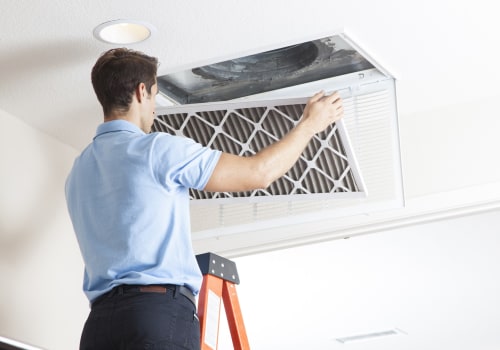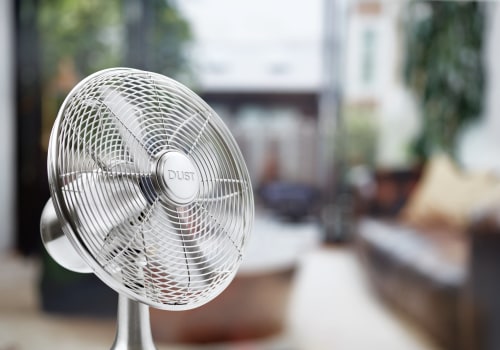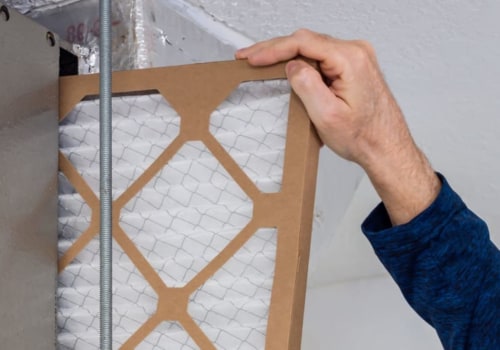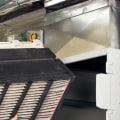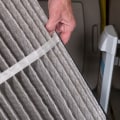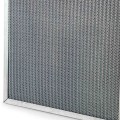Exploring Air Filter MERV Ratings for Improved Air Conditioner Efficiency During Tune-Ups
Ever wondered about Air Filter MERV Ratings? Let's delve into this essential aspect of maximizing air conditioner efficiency. MERV values, on a scale of 1 to 20, reflect a filter's knack for capturing particles. Higher ratings mean superior filtration capabilities. Selecting the appropriate MERV rating for your HVAC system helps improve indoor air quality and help to prevent unnecessary system load.
Though they provide better filtration, high MERV rated filters could need more frequent changes. They could also hinder airflow if not well-matched with your system, so choose wisely!
A well-informed choice regarding MERV ratings makes for a more efficient air conditioner tune-up, contributing to cleaner air and extended system longevity.
Key Takeaways
Superior filtration of varied particle sizes is indicated by more elevated MERV ratings.
To avoid obstruction of airflow, ensure your HVAC systems are compatible with the selected filters.
Regular replacements of filters may become necessary when using those with higher MERV ratings.
Striking a balance between filtration efficiency and airflow performance makes for optimal MERV selection.
Enhanced energy efficiency and improved indoor air quality result from correct MERV rating selection.
Importance of MERV Ratings
Understanding MERV ratings proves pivotal in maintaining superior indoor air quality. As filter selection hinges on this rating, awareness of MERV values ensures the effective removal of airborne contaminants, thus enhancing home air quality. MERV ratings vary, indicating a filter's proficiency in capturing particles of different sizes. Higher values correspond to superior filtration capabilities. By grasping these ratings, decisions regarding air filter choice can be made knowledgeably.
Air quality experiences a direct impact from your air filter's MERV rating. Those filters possessing higher MERV values excel in trapping dust, pollen, and mold spores, along with other airborne particles, thereby improving overall air quality in living spaces. Regular replacement of air filters, especially with ones holding suitable MERV ratings, contributes substantially to a healthy indoor environment. When choosing air filters, always consider the unique air quality requirements of your living space for optimal performance.
Meaning of MERV Ratings
Knowing MERV values helps you choose appropriate filters for your air conditioner. This is what you should know:
MERV rating insights: Ranging from 1 to 20, MERV ratings illuminate a filter's filtration capabilities. Higher numbers suggest better efficiency in capturing tiny particles.
Evolution in filter technology: Technological advancements have birthed more potent filters, boasting higher MERV ratings. Such filters ensnare a larger proportion of particles, enhancing the quality of indoor air.
Efficiency in different particle sizes: Filters sporting higher MERV ratings excel at trapping a diverse range of particle sizes, encompassing allergens, dust, and pollutants.
Airflow constraint: Superior filtration comes with a caveat; filters sporting high MERV ratings might restrict airflow if they aren't compatible with your HVAC system.
Upkeep needs: High MERV-rated filters might necessitate more frequent replacements to ensure peak performance.
Selecting Appropriate MERV Rating
Choosing air filters calls for weighing MERV ratings in relation to HVAC system needs for indoor air quality. Essential for the air conditioners to run effectively, MERV choice is rather important. Higher MERV ratings accompanying enhanced filtering capabilities reflect smaller particle capture, therefore improving indoor air quality. Yet, finding optimal balance remains vital, as extremely high ratings could restrict airflow, causing strain on HVAC systems.
Multiple benefits exist when choosing the correct MERV ratings. Maintaining clean air by trapping dust, pollen, and other contaminants becomes easier, greatly helping individuals with allergies or respiratory problems. Moreover, choosing suitable filters with correct ratings enhances HVAC system performance, prolongs lifespan, and lessens the need for frequent repairs.
Impact of MERV Ratings on Efficiency
Choosing air filters with suitable MERV ratings significantly affects HVAC system efficiency. Consider these impacts of MERV ratings on efficiency:
Energy Conservation: Filters with higher MERV ratings can enhance energy conservation. This reduction in HVAC system workload results in decreased energy consumption, subsequently reducing utility bills.
Quality of Filters: High MERV-rated filters provide superior filtration of contaminants. This improves indoor air quality, lessening the burden on your HVAC system.
Balancing Airflow: Selecting suitable MERV ratings ensures efficient filtration combined with balanced airflow. This prevents issues such as system overheating or freezing.
Health Benefits: High-quality air from higher MERV filters can have a positive impact on your family's health by reducing allergens and airborne particles in your living space.
Boost in Efficiency: Selecting suitable MERV ratings for your HVAC system can enhance its overall performance, extend its lifespan, and minimize the need for frequent maintenance.
Grasping these aspects will aid in making informed decisions when choosing air filters for your HVAC system.
Understanding MERV Vs. Filter Efficiency
Comparing MERV ratings to filter efficiency requires an awareness of their relationship. The effectiveness of a filter in catching particles of different sizes is strongly influenced by filter performance measures.
Eventually, the quality of air in your surroundings will depend on your choice of MERV grade for certain requirements.
MERV & Efficiency Comparison
Understanding MERV ratings compared to filter efficiency requires focusing on the essential concept of filtration effectiveness. Here, five crucial points can help you grasp the MERV-efficiency interconnection:
MERV Ratings: MERV values represent the capability of filters to trap particles of different dimensions.
Filter Efficiency: This term implies the performance of filters in capturing contaminants such as dust, pollen, or pet dander.
Energy Savings: Filters with high MERV ratings might consume more energy due to hindered airflow.
Cost Consideration: Balancing MERV values with energy savings may affect total costs.
Maintenance Importance: Changing filters regularly ensures their performance while maintaining good air quality.
Filter Performance Metrics
Learning the correlation between MERV ratings and filter efficiency is crucial for understanding air filter performance metrics. Essential tests on filters help determine their effectiveness at trapping particles of diverse sizes. Minimum Efficiency Reporting Value, or MERV, is a scale that ranges from 1-20.
Higher values on this scale signify better filtration abilities, which directly affect air quality. High-rated filters can remove more dust, pollen, mold, and other airborne contaminants, offering significant improvements to indoor air quality. Knowledge of the MERV-efficiency relationship is key when choosing air conditioning system filters for optimal performance and cleaner living spaces.
Choosing the Right MERV
Pondering over the correct MERV rating for your air filter? Understand its link with filter efficiency by taking into account these key aspects:
Duration of filter: Filters with superior MERV ratings usually last longer.
Economical: Although filters with higher MERV ratings might seem costly initially, their extended lifespan can lead to savings over time.
Quality of air: Higher MERV-rated filters excel at capturing minute particles, enhancing your home's air quality.
Reduction of allergens: Superior MERV ratings aid in diminishing indoor allergens like dust mites, pet dander, and pollen.
Balance in efficiency: Opt for MERV ratings that strike a balance between airflow and filtration efficiency for top-notch performance.
Frequently Asked Questions
Can Use a Higher Merv-Rated Filter Cause Strain on My Air Conditioner?
Adopting filters with higher MERV ratings could potentially strain your air conditioner, especially if not compatible. Compatibility can be determined by reviewing system specifications. Moreover, with superior filter efficiency, maintenance might need to be more frequent to avoid airflow restriction, resulting in undue stress on the cooling unit.
Are There Any Health Risks Associated With Using Filters With High MERV Ratings?
High MERV-rated filters enhance protection against allergens but could also present health risks. Such filters might compromise airflow, resulting in inferior air quality and potential problems. Striking a balance between efficiency and health remains critical.
How Often Should Merv-Rated Filters Be Replaced?
For optimal efficiency, MERV-rated filters require replacement every 3 months. Despite higher costs, compatibility with most systems is a significant advantage, as is their ability to trap smaller particles. Regular replacements help ensure air cleanliness while maintaining unit performance.
Do MERV Ratings Affect the Noise Level of My Air Conditioner?
Investing in filters with high MERV ratings could reduce your air conditioner's noise level. This is due to enhanced efficiency which lessens system strain, possibly leading to quieter operations. Besides noise reduction, these top-rated filters can also contribute to lower maintenance needs, resulting in cost savings.
Can Merv-Rated Filters Help Reduce Energy Consumption and Lower Utility Bills?
Employing MERV-rated filters boosts energy efficiency, which translates into savings on utility bills. Such a choice benefits not only your wallet but also the environment, fostering sustainability in residential settings. By opting for an improved air filter, you can reap these advantages.
Learn more about HVAC Care from one of our HVAC solutions branches…
Filterbuy HVAC Solutions - West Palm Beach FL
1655 Palm Beach Lakes Blvd., Ste 1005 West Palm Beach, FL 33401
(561) 448-3760
https://maps.app.goo.gl/VarpgNZnxuPQuW8A7

